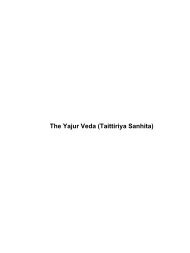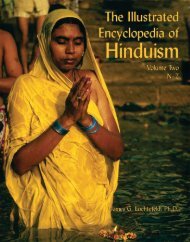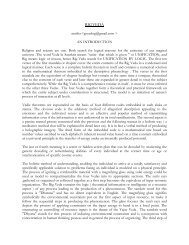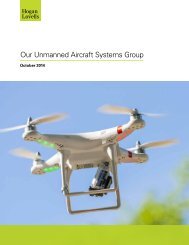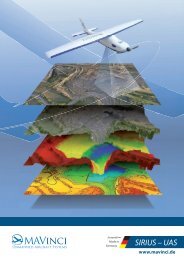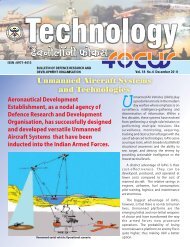The Illustrated Encyclopedia of Hindusim vol 2
Create successful ePaper yourself
Turn your PDF publications into a flip-book with our unique Google optimized e-Paper software.
Samsara<br />
Charles A. Moore (eds.), A Sourcebook in<br />
Indian Philosophy, 1957; and Gerald<br />
Larson and Ram Shankar Bhattacharya<br />
(eds.), Samkhya, 1987.<br />
Sampraday<br />
(“tradition”) Literally, “that which is<br />
handed down,” or the transmitted body<br />
<strong>of</strong> teachings that distinguishes one religious<br />
group from another. Belonging to<br />
a particular sampraday is based on having<br />
received teachings from one’s spiritual<br />
preceptor (guru), thus becoming<br />
part <strong>of</strong> a spiritual lineage, and continuing<br />
the life <strong>of</strong> that sampraday by transmitting<br />
the teachings to disciples.<br />
Although the sampraday is <strong>of</strong>ten translated<br />
as “sect,” this loses its sense <strong>of</strong><br />
uniqueness within particular theistic<br />
traditions. For example, one can speak<br />
<strong>of</strong> different sampradays among Tamil<br />
Shaiva brahmins, by virtue <strong>of</strong> their differing<br />
spiritual lineages, even though<br />
they worship the same deity and share a<br />
common cultural heritage.<br />
Samsara<br />
(“wandering”) <strong>The</strong> cycle <strong>of</strong> reincarnation,<br />
one <strong>of</strong> the most fundamental<br />
assumptions throughout all Indian religion.<br />
In the Indian worldview, reincarnation<br />
in<strong>vol</strong>ves a series <strong>of</strong> births and<br />
rebirths in different realms and forms,<br />
all based on the quality and quantity <strong>of</strong><br />
karma, formed through previous<br />
actions and patterns <strong>of</strong> thought. Beings<br />
with good karma may be born into the<br />
heavens, which are essentially realms <strong>of</strong><br />
pleasure and carefree enjoyment; those<br />
with bad karma may be reborn as animals<br />
or as ghosts, or into realms <strong>of</strong> punishment,<br />
such as hells. Neither pleasure<br />
nor punishment is eternal, although<br />
they may last an extremely long time.<br />
Beings in heaven enjoy the results <strong>of</strong><br />
their past actions, but when their good<br />
karma is exhausted they must take<br />
another, lower birth; beings in realms <strong>of</strong><br />
punishment are paying for their evil<br />
deeds, but when this has been done they<br />
will take another birth, presumably in<br />
some higher status.<br />
Between these two lies the human<br />
realm, which comprises infinite possibilities,<br />
based on various factors—such<br />
as high status or low, wealth or poverty,<br />
health or disability, and the religious<br />
piety <strong>of</strong> one’s natal family. Varying mixtures<br />
<strong>of</strong> good and bad karma combine<br />
for many different human circumstances,<br />
and according to popular<br />
belief one’s present life and body are a<br />
record <strong>of</strong> one’s past. <strong>The</strong> notion that<br />
people are, in life, where they deserve<br />
to be because <strong>of</strong> karma can be seen as<br />
the basis for the caste system.<br />
Fulfilling one’s particular social role<br />
(svadharma), no matter how humble,<br />
not only upholds the social order but is<br />
a means for individual spiritual<br />
advancement.<br />
<strong>The</strong> human realm is widely believed<br />
to be the best <strong>of</strong> all for spiritual life,<br />
partly because human beings can<br />
make rational choices, including the<br />
decision to take part in religious life. In<br />
this humans are different from animals,<br />
which are driven mainly by their<br />
instincts, and from ghosts or helldwellers,<br />
who are simply expiating<br />
their past acts. At the same time<br />
human life, unlike life in the heavens,<br />
is full <strong>of</strong> reverses and sorrow continually<br />
reminding human beings about<br />
the transience <strong>of</strong> life and possessions<br />
and the need to engage in spiritual<br />
development. Embodied existence is a<br />
constant cycling from one realm to the<br />
next, leaving one body and assuming<br />
another, and the inherent uncertainty<br />
<strong>of</strong> this condition has led to the search,<br />
dating from the time <strong>of</strong> the speculative<br />
texts known as the Upanishads, for an<br />
unchanging state, completely out <strong>of</strong><br />
this cycle <strong>of</strong> rebirth. This unchanging<br />
state is widely accepted as life’s<br />
supreme goal, although in any generation<br />
very few actively seek it, with most<br />
people content to relegate it to some<br />
indefinite future lifetime. For further<br />
information see Wendy Doniger<br />
O’Flaherty (ed.), Karma and Rebirth in<br />
Classical Indian Traditions, 1980.<br />
589




